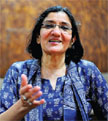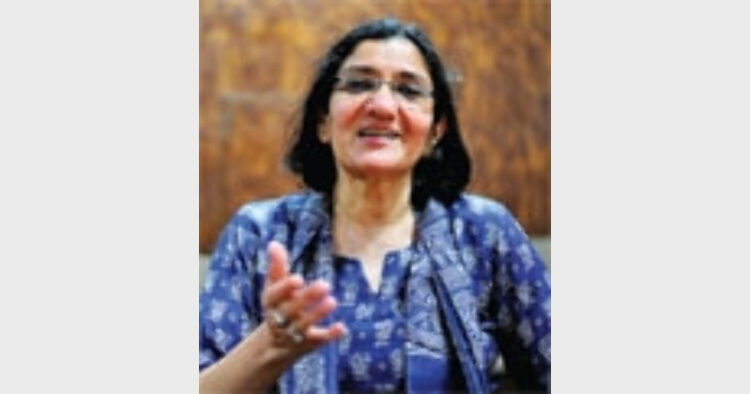 10 years ago, she decided that she will fight for the rights of Muslim women and today she is the voice of many oppressed Muslim women. Zakia Soman, the co-founder of Bharatiya Muslim Mahila Andolan (BMMA), is spearheading the movement for demanding a ban on the practice of triple talaq and calls it a violation of Constitutional provisions. In an interview with Organiser, Zakia shares her mind and thoughts on the matter with Nishant Kr Azad. Excerpts:
10 years ago, she decided that she will fight for the rights of Muslim women and today she is the voice of many oppressed Muslim women. Zakia Soman, the co-founder of Bharatiya Muslim Mahila Andolan (BMMA), is spearheading the movement for demanding a ban on the practice of triple talaq and calls it a violation of Constitutional provisions. In an interview with Organiser, Zakia shares her mind and thoughts on the matter with Nishant Kr Azad. Excerpts:
The perception is; Triple talaq violates the right to equality of Muslim women as well as their dignity. Even Court calls it unconstitutional and said no Personal Law Board is above Constitution. What is your opinion?
Triple talaq is a violation of Quranic injunctions and Constitutional provisions. The Quran clearly calls for efforts towards reconciliation and mediation over a period of 90 days before a Talaq is finalised. There should be full involvement of both husband and wife in this process; the question of a unilateral arbitrary instant talaq does not arise. It should be stopped forthwith.
Muslim bodies and institutions like the All India Muslim Personal Law Board (AIMPLB) argues that triple talaq is mentioned in the Quran and also asked Government and court not to interfere in these matters in the name of secularism. How can one reach to a logical conclusion?
The AIMPLB is a self-appointed conservative patriarchal body that claims to be speaking on behalf of all Indian Muslims. They don’t represent the religion or the community. In our religion there is a direct relationship between God and the human being and there is no space for intermediaries. These rampant misinterpretations and distortions such as triple talaq have done a lot of disservice to the community. A Muslim woman is an Indian citizen and she is entitled to justice as per the Constitution. We are confident that we will get justice from the courts.
Triple talaq has been abolished in so many Muslim countries. What is the road ahead to reform Muslim Personal Law in India?
We need a comprehensive reform in Muslim Personal Law in our country. We want the Parliament of India to pass a Muslim family law based on the principles of justice and equality. The BMMA has prepared a draft law in consultation with over 50,000 women over a period of ten years. The key highlights are the age of marriage should be 18 years for girls and 21 for boys, method of talaq to be the
talaq-e-ehsan method over a period of minimum 90 days, triple talaq to be made illegal, polygamy to be made illegal, nikah halala should be made punishable offence, guardianship and custody of children to be given both to mother and father, women’s share in property to be stipulated by law etc. We want the Parliament to adopt this draft and pass it to make it into a gender just law. It is 1,400 years since the Quran gave equal rights to women and the same was given by tha Indian Constitution after Independence. Muslim law should be reformed just like Hindu law, Christian law etc have been amended/ reformed from time to time.
Instead of making it an issue of gender discrimination, politics is played in the name of ‘secularism’. How do you see this?
Triple talaq is about gender discrimination. Ending triple talaq is imperative for gender justice and equality. Giving men from a community a free license to violate the rights of women within the community can hardly be called secular! Secularism cannot be a shield for patriarchal practices! Secularism is a principle of our Constitution and it cannot be misinterpreted for violation of womens’ rights!
Like triple talaq, there is so much to say about halala, your thoughts on this?
Halala is a barbaric and inhuman practice without any Quranic sanction. It demeans a woman and results in absolute commodification of a woman. This barbaric practice should be outlawed and men indulging in it should be put behind bars.
Many argue that women have not been made aware of ‘khula’, their right to divorce.
A Muslim marriage is a social contract and the right to divorce is given to both wife and husband. A wife can initiated divorce proceedings under the khula provisions. She can use it to end the marriage if she faces cruelty or injustice or if she doesn’t want to continue for whatever reason in the marriage.
Illiteracy rate is also very high among Muslim women, don’t you think, this is also a reason behind this discrimination?
The Muslims are poor and educationally and economically
backward. The Muslim woman faces multiple marginalisation owing to poverty, lack of education, lack of income generation opportunities, patriarchal personal law practices etc. The key is social reform through mass scale awareness and education of the community and specially girls and women. An educated girl can be economically independent and negotiate her rights in marriage, family and society.
Your thoughts on the Uniform Civil Code. Don’t you think it is need of an hour?
Just like abolition of triple talaq, the Uniform Civil Code too is an important issue. But these are two separate and important issues. The question of triple talaq applies to Muslims but the Uniform Civil Code question is for all Indians, including Hindus, Muslims, Christians, Parsis etc to discuss, understand and debate on.
How are women from Muslim community responding to your initiative? What is the response of men? Ultimately they are the ones whose mindset is to be changed.
Today, 99 per cent women want triple talaq to be abolished. Not just that a good 70 per cent of Muslim men too want this to happen. An average Muslim is today aware about there being no sanction for triple talaq in the Quran. Plus every woman who receives triple talaq is also someones’ daughter, sister or mother. The community wants change and this injustice to women should be stopped. That is why despite their desperate efforts the Personal Law Board’s
signature campaign did not succeed. Today, an average educated Muslim supports BMMA and the Muslim
sisters. Not just this, all Indians support this legitimate demand of Muslim women. We are overwhelmed by the support from all sections of society.
BMMA is in its tenth year. Are you satisfied with the way things is going on since the organisation came into existence in 2007?
Although we have a long way to go towards reformation in society and building a harmonious world, the BMMA has a lot of satisfaction on completing 10 years. We have been able to drive home the issue of gender justice in Islam being non-negotiable. We have also been able to raise our voice as Indian citizens and we are happy that all of this has happened under the leadership of ordinary Muslim women.













Comments